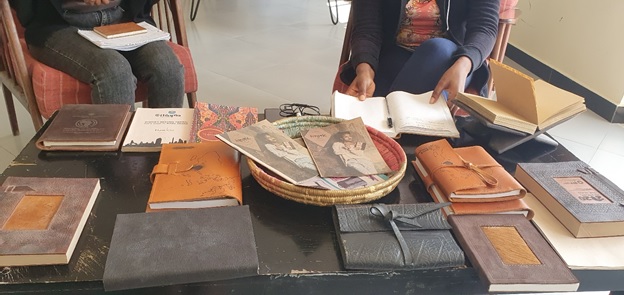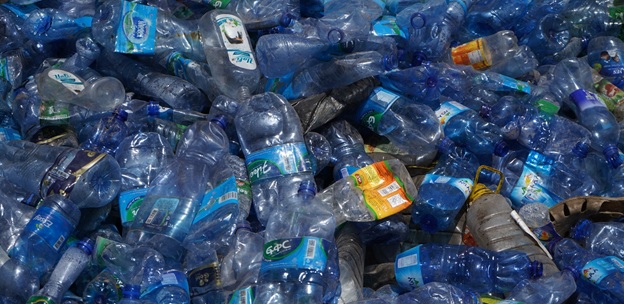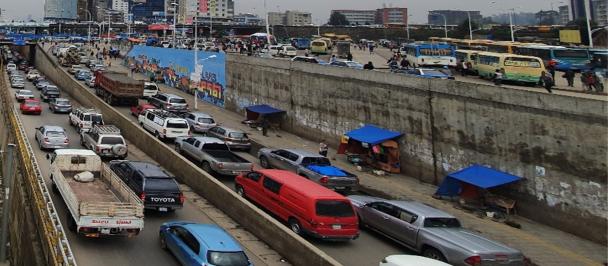UNDP Ethiopia's Accelerator Lab went on a three-day solution safari to explore the different waste products that are made locally and meet the entrepreneurs behind them to uncover how and why they started their businesses.
Accelerator Lab blog
Our exploration of the informal waste management system in Addis Ababa opened our eyes to the many waste-related activities that take place outside of and in conjunction with formal waste collection and management.
We sensed an informal system of waste collecting, recycling, upcycling and reusing that has one of the highest recycling rates in the east and central Africa. This exploration uncovered some interesting value chains for different waste types, so we wanted to dive deeper and map companies, entrepreneurs and individuals who are creating innovative ways of using waste. This would give us a better understanding of the waste value chain, bring light to the less recognized informal sector and make connections to straighten the market.
We went out on a three-day solution safari to explore the different waste products that are made locally and meet the entrepreneurs behind them to uncover how and why they started their businesses. We focused our attention on plastic, paper, metal, and organic waste since they are the most common types of waste collected. The physical solution safari was limited to Addis Ababa, but we reached out to the private and public sector stakeholders who work in this area to explore activities outside of the capital and meet with companies and entrepreneur virtually.
Through this process, we mapped 58 solutions across the city, giving more focus on small business and social enterprises but also a few long-established companies to highlight how they and the sector have evolved over the years.
Speaking with the entrepreneurs, we saw some common interest in environmental protection and the need to aid the waste management system. But more crucially, people seeing the value in waste has been a bigger driving force to recycle and reuse than any policy or regulation. Whether it is due to the lack of raw material in the metal industry, or the lack of foreign exchange that makes importing virgin paper products expensive, these factors have created an opportunity and while only some have taken advantage of it many more can also do so.
One of the companies we spoke to was Rose Waste Management which started 15 years ago with two waste collecting truck and 10 employees. However, the company has now evolved into the Rose Business Group that includes a segregated waste collection for institutions, cleaning services, plastic recycling factories that produce conduit, collecting glass and paper that are sold to recycling companies and even a dairy farm that consumes food waste from beer production. While this story is encouraging, it is not common.
Despite the existing culture of reusing and recycling, there are less than 10 formal large scale recycling factories in Ethiopia most of which are foreign-backed or owned. Therefore, the solutions we mapped were small scale and at the grassroots level that has the potential to expand and get community involvement.
We wanted to share with you some of the unique and inspiring solutions that we came across until we create a virtual catalogue.
MALEDA CRAFT
Alemayehu founded Malada Crafts to provide an outlet for his creativity while making an environmental impact. In his workshop, Alemayehu designs bags and shoes out of diaper bags and textile scraps. Alemayehu has found a way to weave these items into unique patterns that become incorporated into shoes and bag in combination with local leather. Because the formal waste collection process doesn’t have source segregation, it is difficult for Alemayehu to get clean materials to form waste collectors so instead, he relays on his immediate community to give him the diaper wrapping plastics and he buys the textile scraps from his small-scale garment manufactures. Being a company that works in upcycling, Alemayehu also thinks about ways he can reduce his waste by reusing his materials as much as possible.

FELEK NOTEBOOKS
Feleke was born out of the desires of a print press to reduce its environmental footprint by recycling the paper waste they generate. To do so they leaned on Ethiopia’s long history of bookmaking to create artisan notebooks out of recycled paper. They take the paper waste and recycle it on-site to make inside covers and mixed interiors pages. This social enterprise has found creative ways of incorporating recycled car tires as notebook covers and goat hair as design accents in their notebooks to create a unique look and feel. while create a responsible corporate culture by consuming their waste, Feleke also provides recycled paper to other companies with the hopes of addressing some of the demand for paper products. Felek also takes on social responsibility by providing school notebook for children in rural Ethiopia from the sale of their notebooks.

HENOK – METAL ARTS
Henok Tsegaye is a graduate of Addis Ababa polytechnic college and has been turning scrap metal into incredible sculpture for more than three years. It is unbelievable what Henok can do with a few pieces of scrap metal with a bit of innovation and creativity. His sculptures take anywhere from a few days to a couple of months depending on the complexity and size of the work. He wields his sculptures from abandoned machinery parts, scrap metals such as screws, nuts, bolts, gears and so on. Henok said coming up with art from scrap metals is not an easy job because it takes a longer time and accuracy. Sometimes getting the scrap metal parts itself is not an easy job. He mostly collects the scrap metal from different metal workshops in Addis and Somale Tera – used items market in Marcato.
Henok currently displays and sale his products in different galleries in Addis and he is planning to have his gallery permanently display his metal artworks in the future. Henok has institutional and individual buyers and his price ranges from 445 USD to 6000 USD.

Assorted organic waste businesses.
In the city, there are few public and private initiatives working to convert organic solid waste into a business. Mintesinot is an association that comprises youth groups that are striving to make a living by adding value to waste through the connection of solid waste (human and livestock), urban agriculture (backyard gardening and livestock), beekeeping, and energy production. They are engaged in vegetable production, pig and sheep fattening, dairy, and poultry. Mintesinot partners with Shito another youth cooperative that supplies human excreta for compost production. While it is not common, it is possible to use human excreta for compost production that will be used for food production however it needs to be tested and monitored. Therefore, Shito has placed portable toilets in the neighbourhood and transports the human excreta to the composting site where they are experimenting in collaboration with Hawassa University.

WHAT IS NEXT
Over the three days, we heard inspiring stories of young people building their business while being environmentally conscious and using creative ways to address the many challenges of waste management along the way. Alongside the larger recycling and waste management companies that are working on institutions, we saw the small enterprises that are focused on their communities and bringing grassroots innovations to address the challenges they see. As a lab, we look for a solution that engages communities for a broader impact and aim to change the system. Therefore, we plan to incorporate these solutions as part of the experimentation on household waste sorting.
This solution mapping and safari we have done so far will culminate into a solutions fest we are organizing with Addis Ababa Solid Waste Management Agency next month. The solution fest will showcase the many different ways waste is turned into valuable products and create a platform to connect the actors across the value chain. We will also be holding a dialogue on how to stimulate the waste market and how to implement extended producer responsibilities when it comes to waste management.
If you are interested in this topic and have any ideas or suggestion, we would love to hear from you throughout email address. ethiopia.acclab@undp.org

 Locations
Locations

